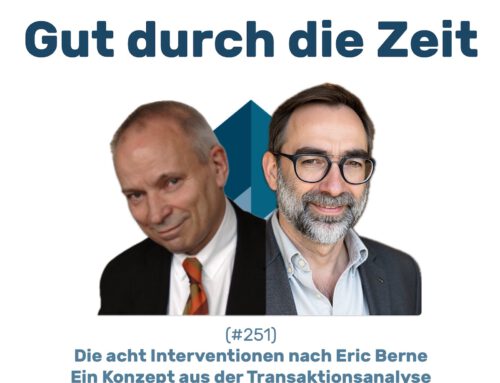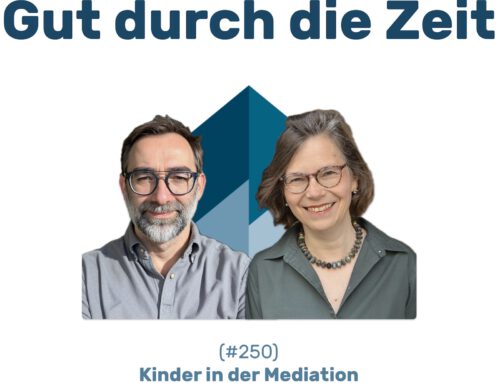#30 EdM – Involuntary mediation because the client doesn't want it?
If the client does not actually want mediation.
Episodes of mediation.
The podcast on practical questions about mediation and conflict management.
Welcome to the episodes of mediation,
the INKOVEMA podcast on the practical issues of mediation and conflict management.
I am Sascha Weigel and in this podcast I explain case questions from my mediation and conflict counselling practice. I present concepts and models of mediation and categorise different perspectives and decision-making options.
Chapter
Full transcript
[0:03]Welcome to the podcast Episodes of Mediation, the podcast by
[0:12]
Introduction to mediation
[0:09]INKOVEMA on the practical issues of mediation and conflict management. I am Sascha Weigel and in this podcast I explain case questions from my mediation and conflict counselling practice. I present concepts and models of mediation and categorise different perspectives and decision-making options. This is episode 30: Involuntary mediation because the client doesn't want it? When the client doesn't actually want mediation. Yes, that's right. There is this paradoxical constellation where mediation takes place even though the client doesn't actually want it. And I don't mean that he is unaware of this, but simply that the same problem arises on the client side as on the mediator side in view of the principle of voluntariness. But first things first. In a conversation with a colleague who works as a mediator and is interested in organisational mediation.
[1:16]Interested, I wanted to explain the differences and issues that come up. And when I talked about the voluntary nature of it, it was clear to them that, oh yes, then they usually don't want to do it, the parties to the dispute, because they are forced to do so by their employer. And then I had already realised that there was a contradiction, but I hadn't yet realised exactly what it was all about. I left it at that and the next day I had a clarification meeting.
[1:48]The constellation was as follows and it led to this case constellation. In one department, employees, superiors and team members had been at odds with each other for a long time, had misunderstood each other and had been quite hurt, emotionally hurt. The matter was actually clear. And yet mediation was suggested and wanted by this party. And it was then customary for me to ask for someone higher up in the hierarchy who would then take on the task of mediating with the employees. And so I was then referred to the head of department or division manager. And I explained to her what the situation was like and then asked, because it was a larger company where I knew that there was also an employee representative body, i.e. a works council, whether the works council was aware that this dialogue was taking place, that this mediation process was to take place. And that was denied and I found that strange.
[3:04]He didn't know about this conversation specifically, but that this process was to take place. And that was also the starting point. It was supposed to be tried again here, but the people involved didn't actually want it that way. And I found it strange to then intervene, even if I then did a good job of ruining this assignment. Because the situation quickly turned out to be such that the division manager didn't think this mediation made sense either and it was actually clear that the poor performance and specific behaviour would be sufficient for a discontinued employment relationship based on a subjective point of view, but certainly well documented and in any case a firm opinion. And this also had to be made clear.
[3:57]And the only point that ultimately prevented this declaration from being made was the intervention of the works council. This works council wanted another clarifying discussion to take place. But it didn't work out at all. And I then also made it clear that I actually think a clarifying discussion between the employer and the works council is the right thing to do here about how employees are treated and what culture is cultivated. And that might be worth a mediation meeting. But of course that's a completely different ball game, that's a completely different situation. Of course, the parties involved want to and can first see whether they can bring about clarification themselves before bringing in an expensive and confrontational external consultant or mediator. But this is supposed to be about the constellation and it is not uncommon, I would assume.
[4:55]
Involuntary mediation in the company
[4:53]And with pleasure gives Feedback, when her the also knows. In Organisations is sometimes the Situation so to describe, that the Parties to the conflict, the quarrelling Persons, the Mediation want and to their superiors, to the Organisation Go and the one Mediation en facto compel, so the Payment the Mediation and the Commissioning one external.
[5:20]Actually these Persons in their Role even not so very in favour are and not exactly know, is the actually the suitable Instrument. But the Employees are there very thereof convinced and Mediation leaves itself then sometimes heavy reject. For the Mediater provides itself in the Practice, have I the Question still not belongs, but in the Theory should the on each Case placed become, is the Mediation then at all feasible, when the Client one, in the Case the Organisational mediation.
[5:54]The even not wants. Jobs itself here not also Voluntary topics in the Senses of the Mediation Act, likewise like with the constellation, that one the Parties to the conflict not so right wants or, itself forced feels, this Conversation to be carried out. Should one the Voluntariness not also on these Participants the Mediation Coins and the Topic Voluntariness principle again from the Perspective sharper edges view. About this becomes mine In my opinion clearly, that it even not at Desire and Mood goes with Voluntariness and the free Will itself therein expresses, that one with one Smile the Mediation opened, but that the a complex, multi-layered Weighing programme is, with the also good Reasons in favour exist, No to say, but ultimately a Yes decided was and communicates was. Who so as Mediator is.
[6:57]Very exactly detected, like the Parties to the conflict in the Room are and whether them the also really want, these Mediation, at so fast like possible say to can, no, under the Circumstances am I even not ready, because the against the Mediation Act violates. The should itself superior, whether he just as fine detected, like because the Client persons to the Mediation steal or whether them not simple also good Mine to the evil Game make, because so bad against Mediation argues become can. What would be the because also for a Feedback from Client persons and Organisations, that one Mediation in your Trap little promising appears? I know you yes, mine love Ladies and mine love Gentlemen, the it as far as here Driven have.
[7:43]
Perspectives on the voluntary principle
[7:43]These admittedly very specific constellation, the but in the Practice really Relevance has, can again clarify, also with which Perspective one the Voluntariness principle strong makes.
[7:57]And the shall it for today also been be, this Aspect to the Topic Voluntariness in one Constellation named to have. When you Similar know or still Variations, the still one additional Building block bring can, then write me with pleasure and contact me under s.weigel.inkofema.de or Go direct on the Website and Go there on the Contact form. For the Moment thank you I me, that you here with thereby were. Give with pleasure Feedback and support this Podcast in his Distribution and content Alignment. Comes good through the Time. I am Sascha Weigel, yours Host from the INKOVEMA, the Institute for Conflict and Negotiation management in Leipzig and Partner for professional Mediation and Coaching training programmes.





Leave A Comment